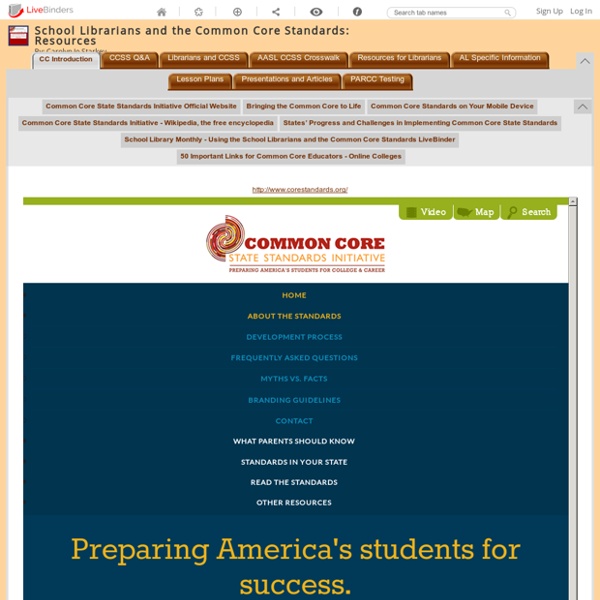



Common Core and School Librarians School Library Monthly/Volume XXVIII, Number 1/September-October Common Core and School Librarians: An Interview with Joyce Karon by Pamela K. Kramer Pamela K. The Common Core Standards (CCS) are at hand! I asked Joyce Karon, a former school librarian, district coordinator, former member of the Illinois State Board of Education and the Illinois Board of Higher Education, to discuss these standards with me. Q: What are the Common Core Standards? A: The simple answer is that they are academic standards for K-12 education designed to prepare students for college and career readiness. Q:How are the CCS similar to or different from other standards? A: To begin with they are clearer. Q: What do the standards mean for students, for teachers? A: We all agree that students have a right to a good education. For teachers there are interesting implications. Another implication for teachers is that it will now be possible for administrators to identify and measure what successful teaching looks like.
Crosswalk of the Common Core Standards and the Standards for the 21st-Century Learner Skip to main content ALA User Menu Search form A Division of the American Library Association You are at: ALA.org » AASL » Learning Standards & Program Guidelines » Learning Standards & Common Core State Standards Crosswalk Share this page: Share on Facebook Share on Google+ Share on Pinterest Print Learning Standards & Common Core State Standards Crosswalk The following pages include tables that help school librarians learn how the AASL Standards for the 21st-Century Learner and the Common Core State Standards align. English Language Arts Reading Standards for Literacy in History/Social Studies Reading Standards for Literacy in Science and Technical Subjects Writing Standards for Literacy in History/Social Studies, Science, & Technical Subjects Mathematics Lessons submitted as part of the Standards for the 21st-Century Learner Lesson Plan Database contain an automatic crosswalk between AASL learning standards and the Common Core State Standards. © 1996–2015 American Library Association
Rigor is NOT a Four-Letter Word Answering questions about library impact on student learning This essay reports on a project which evaluated the Understanding Library Impacts (ULI) protocol, a suite of instruments for detecting and communicating library impact on student learning. The project was a dissertation study conducted with undergraduates enrolled in upper-level and capstone history classes at six U.S. colleges and universities in 2011. My first essay for In the Library with The Lead Pipe introduced the protocol and provided background on the approach. This essay uses selected results from the 2011 project to demonstrate how the protocol works and suggests ways readers can get involved with future ULI projects. High expectations for higher education These are trying times in U.S. higher education. Support for teaching and learning is at the heart of most academic library mission statements. Just what outcomes do libraries influence? In my opinion, doing nothing is not an option. The ULI protocol is designed to meet this challenge. What are student learning outcomes?
All Aboard!: Implementing Common Core offers school librarians an opportunity to take the lead. By Rebecca Hill, 3/30/2012 OK, so school librarians weren’t invited to the party. When members of the National Educational Association, the National Council for Teachers of English, the International Reading Association, and the American Federation of Teachers met in 2010 to draft new benchmarks for language arts and literacy for our nation’s K–12 schools—the Common Core Curriculum State Standards (www.corestandards.org)—there weren’t any media specialists at the table. Even though school librarians have been longtime champions of information literacy, reading, and critical thinking—all prime pieces of Common Core—we weren’t asked for our input. As a growing number of states and large school systems, including those in New York City, Boston, Cleveland, and Philadelphia, grapple with plans to implement the ambitious new standards, school librarians still aren’t consistently invited to pull up a chair. It’s a worthy goal. Where librarians fit in She should know. The big shift